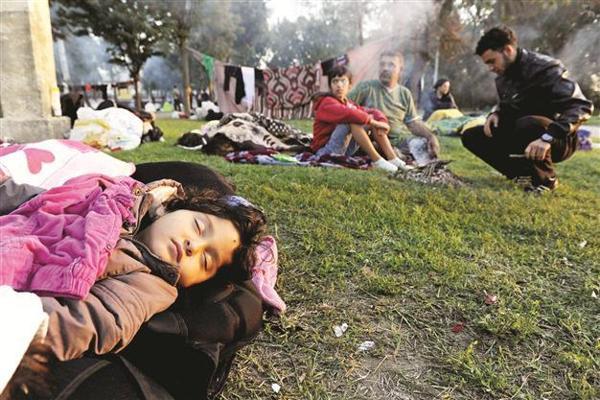European Council, parliament at odds over Turkey
Sevil Erkuş - BRUSSELS


A migrant child sleeps at the surrounding area of the Sarayiçi oil wrestling arena in Edirne, Turkey, September 21, 2015. Bitterly-divided European leaders will seek to find a credible response to the continent's worst migration crisis since World War Two at an emergency summit this week. REUTERS/Alexandros Avramidis
European Council President Donald Tusk’s warning to Turkey that it will only win concessions from the EU, such as fast-tracked travel visas, if it successfully reduces the flow of refugees reaching Europe has drawn reaction from the European Parliament.“Who do we think we are? If we are dealing with over 160,000 refugees for settlement, who are we to point fingers at Turkey that hosts 2 million refugees?” the European Parliament’s rapporteur for Turkey, Kati Piri, told the Hürriyet Daily News on Oct. 14.
“I was shocked at Tusk’s remarks. Threatening doesn’t help. We need Turkey. In the end, we need to find a common way,” she said, acknowledging that the EU for a long time did not pay attention to the burden that Turkey was paying.
“I know that it is not comfortable for Europe to be on the demanding side when it comes to President Recep Tayyip Erdoğan. We need something from Turkey. Of course, Erdoğan, as he has always done, tries to use it in his own way by linking it to safe zones in Syria which I think will cause a bigger influx of refugees because nobody will want to go to these safe zones. Erdoğan is also trying to link it to ease enough conditions for accession,” she said, but refused to link those issues to the refugee crisis as well.
“We cannot link enlargement to migration when we are discussing. That’s very dangerous,” Piri said, criticizing the European Commission’s strategy on negotiations for a migration action plan.
“But the European Commission is trying to link it. It says if Turkey is not a safe country, then it cannot be candidate. It’s a dangerous [thing to] think, linking 1 billion euros and saying we are giving it to Turkey. It’s not your money. This is money for accession. This is not a frank way to get into a dialogue with partners,” she said.
Commission seeks migration plan for visa liberalization of Turkey
The commission is seeking to associate a migration action plan for the implementation of visa liberalization for Turkey, which would be accelerated if Ankara meets the EU’s demands to block the flow of Syrian refugees into Europe.
EU officials deny a link between the postponement of its annual progress report on Turkey, which was planned for Oct. 14 but delayed until an unspecified future date, and the migration action plan that the commission is discussing with Turkey on curbing the flow of refugees to Europe.
Some in Brussels have suggested the report was postponed as part of a softening of the tone of criticism against Ankara at a time when the EU expects Turkey to assist with the refugee crisis.
The decision to postpone the progress report for the first time ever came as Erdoğan was visiting Brussels after almost two years, suggesting that the Turkish president did not want a critical report on Turkey ahead of the Nov. 1 elections.
Moreover, British Prime Minister David Cameron has asked EU member states to postpone the report until after the Nov. 1 polls. But a decision has yet to be taken for the date of the release, according to commission officials.
The progress report was expected to broadly highlight problems in freedom of expression, the impartiality of the judiciary and the pressure on the media.
Tonino Picula, a member of the center-left Social Democratic Party of Croatia (SDP) and a member of the foreign affairs committee, hinted on Oct. 14 at a mutual understanding between Turkey and the European Commission. Turkey is being tested by the EU on dealing with the refugee crisis, while Ankara is testing the EU as Erdoğan “does not want criticism” from the union, he said.
Press freedom in Turkey at lowest level
The freedom of press “has always been under pressure in Turkey, But now it’s at the lowest level,” Piri told the Daily News on Oct. 14.
“If one rates from one to five, Turkey now gets one. It cannot get much worse than it actually is right now,” she said.
Elaborating on the Turkish government’s recent mounting pressure on the media, Piri said the EP was highly critical on Turkey.
“A very slight majority in the parliament, in principle, are in favor of Turkish accession [to the EU]. The ones that are critical of Turkey are the ones that are genuinely worried about what’s happening in Turkey. I count myself in that group,” Piri said.
“If we stop negotiations with Turkey, we cannot open it and we come to a very dangerous point in relations with Turkey looking at the deteriorating situation,” she said.
In issues such as refugee crises, the EU needs to talk to Turkey, she said. “There is no other way. Turkey plays a key part in the solution to at least managing the flows.”
Piri also criticized Erdoğan for polarizing Turkey at a crucial time for the country.
“One of the problems is that Turkey is so polarized that it would need a president at this moment … who will play the role of bringing groups together. I see a president who is very good in dividing groups. That’s a big problem,” she said, adding that Turkey was facing a critical juncture in its history.
